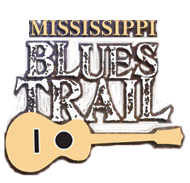Gatemouth Moore
Gatemouth Moore - Yazoo City
Arnold Dwight “Gatemouth” Moore was one of America’s most popular blues singers in the 1940s before becoming a renowned religious leader, radio announcer, and gospel singer. He served as pastor of several churches in Mississippi and Louisiana, including the Bethel A. M. E. Church and Lintonia A. M. E. Church in Yazoo City. Moore, who was born in Topeka, Kansas, on November 8, 1913, spent much of his career in Memphis, Kansas City, and Chicago. He died in Yazoo City on May 19, 2004.
Moore was the tuxedoed toast of the blues world when he strode from the gambling table to the stage of Chicago’s Club DeLisa one December night in 1948. But when he tried to sing, nothing came out, until, finally, he broke into the old spiritual, “Shine On Me.” According to a columnist for Chicago’s African American newspaper the Defender, Moore “ran off the stage and about seven blocks in the snow screaming and yelling ‘I’m saved.’” This was but one of many dramatic and colorful moments in the career of Moore, who entered the ministry and remained a newsworthy national personality in all his varied fields of endeavor.
A descendant of emancipated slaves who emigrated to Kansas from Tennessee during the historic “Exoduster” resettlement movement of the late 1870s, Moore sang ballads and spirituals as a youngster in Topeka. In his teens he left with a traveling show, joined the Port Gibson-based Rabbit Foot Minstrels, and ended up in Clarksdale around 1934. A year or so later he caught a ride to Memphis and launched a new career as a blues shouter. At a show in Atlanta an intoxicated woman gave him his nickname, he recalled: “I opened my mouth and she looked up and hollered, ‘Ah, sing it, you gatemouth S.O.B.!” Moving between Memphis, Kansas City, and Chicago, he toured with some of the country’s top bands and wrote and recorded hits such as “I Ain’t Mad at You Pretty Baby,” “Did You Ever Love a Woman,” and “Somebody’s Got to Go.” Both B.B. King and Rufus Thomas considered Moore a major influence; they not only recorded his songs but remained close friends with him through the years.
Moore was ranked in the top rung of vocalists in national polls by the Defender when he felt the calling to preach. He carried his flair for showmanship with him into the ministry, as a gospel singer and recording artist, as the host of radio and television programs, and as a raconteur whose tales could stretch the limits of belief. His elegance and exuberance enabled him to easily cross social, racial, and religious lines, and though he devoted himself to the church, community work, charities, and education, he still enjoyed singing the blues on occasion. A pastor of both Baptist and African Methodist Episcopal churches, a leader of the “black Elks” (IBPOEW), president of the Birmingham Black Barons baseball team, and an emcee at both blues festivals and religious conventions, Moore once delivered a eulogy for the closing of the Club DeLisa and preached one famous sermon from a casket and another from a cross. In 1974 the A.M.E. Church assigned him to Yazoo City, where he married high school counselor Walterine Coleman. Moore, who attained the rank of bishop, received a brass note on the Beale Street Walk of Fame in 1996, and his widow was presented with a resolution in his honor by the Mississippi Senate in 2004.
Other noted singers who have called Yazoo City home include Jo Armstead, Kenzie Moore, and Robert Covington. Jo Armstead (b. 1944) left Yazoo City in 1961 to become an Ikette with the Ike and Tina Turner revue. She later co-wrote several R&B hits, including “Let’s Go Get Stoned,” “Jealous Kind of Fella,” and “Sock It To Me.” Kenzie Moore (1929-1987) was a football star and WAZF deejay who sang with the Joe Dyson band in Jackson and recorded “Let It Lay” and other songs for the Specialty label in 1953-54. Covington (1941-1996) played drums with a number of Chicago blues artists, most notably Sunnyland Slim, and was featured as a singer on the 1988 album The Golden Voice of Robert Covington.
content © Mississippi Blues Commission
[ BACK TO TOP ]

